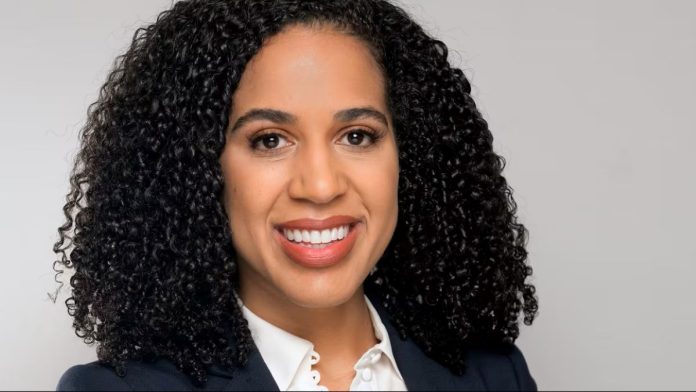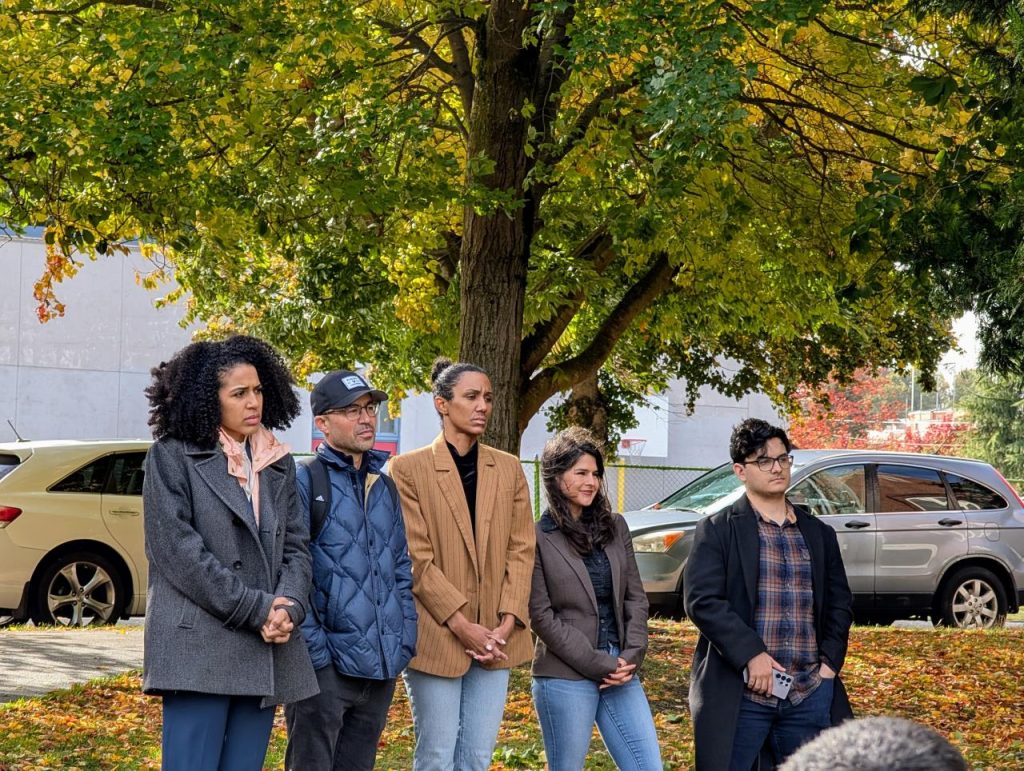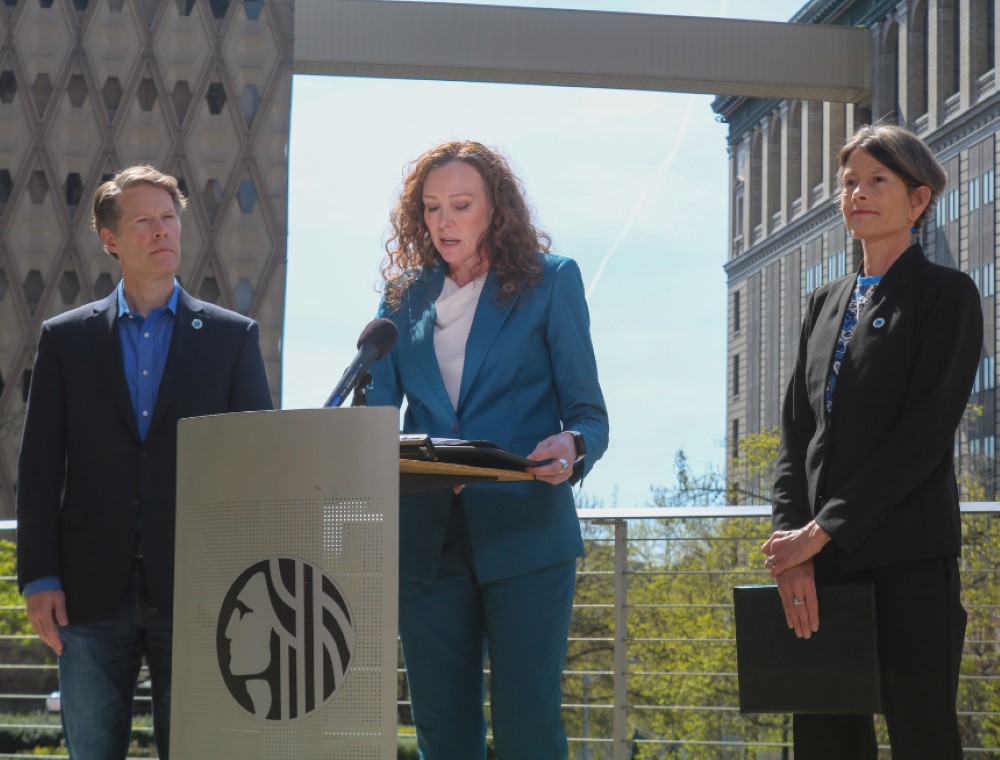
In the November election, former federal prosecutor Erika Evans decisively beat her opponent, one-term Seattle City Attorney Ann Davison. Evans racked up a 31-point lead by the end of the day Friday, with roughly 50,000 ballots left to count. Nearly two-thirds of Seattle voters sided with Evans.
Evans will be the first person of color to hold the office of Seattle City Attorney.
While the Seattle City Attorney’s Office serves both criminal and civil functions, the city attorney only handles low-level misdemeanor cases. More serious felony cases are handled by the King County Prosecuting Attorney’s Office. The city attorney also defends the city from lawsuits, advises the city on legal matters, and enforces city regulations such as labor laws and renter protections.
And as Davison has ably shown, the city attorney can act as an advocate to advance criminal legal policy.
Davison was elected in 2021 as a rare Republican in office in Seattle after a tight race with abolitionist Nicole Thomas Kennedy. Her election, along with that of Bruce Harrell as Seattle Mayor and Sara Nelson as a city-wide city councilmember, was hailed as a backlash against the more progressive ideas championed during the 2020 George Floyd protests.
At the same time, crime numbers were going up, most likely caused by the Covid-19 pandemic. The Seattle Police Department’s crime numbers peaked in 2022 and have shown a marked decrease this year.
The results of last week’s election signal another shift in voter sentiment, delivering a resounding rejection of Davison’s punitive tough-on-crime policies and what some residents have perceived as an insufficiently hard line against the Trump administration from the City’s only Republican elected official.
In contrast, Evans touted her federal experience, her community connections, and her commitment to supporting evidence-based policies proven to help folks suffering on the streets. She’s also a mainstream Democrat who has pledged to stand up to Trump overreach.
“I’m just really excited for bringing in that heart and compassion and care that aligns with our values here in Seattle,” Evans said.
Evans told The Urbanist that she would focus the City Attorney’s Office on bringing cases they could actually win and expanding pre-filing diversion to keep less serious crimes out of the court system and into restorative justice pathways.
“Last year, there was a 60% dismissal rate for all cases set for jury trial, and that’s too high,” Evans said. “Too many cases are just being overcharged for numbers.”

Councilmember Sara Nelson, who won in 2021 on a law-and-order platform that mirrored Davison’s approach, also lost her re-election bid last week by more than 23 points. Nelson endorsed Davison, along with many of her centrist colleagues. Challenger Dionne Foster emphasized affordability, progressive revenue, and addressing root causes of crime during her run.
Davison’s four-year term
Upon winning office, Davison faced a huge backlog of cases, which she blamed on her predecessor Pete Holmes, but which was almost certainly partly due to pandemic chaos. Within a few months, she’d announced she was dismissing almost 2,000 misdemeanor cases. Later that year, she dismissed even more cases.
Although she campaigned against Holmes by criticizing the time his office took to file cases and his failure to prosecute the more serious cases of the office aggressively enough, an analysis by PubliCola shows that Davison often performed very similarly. Her opponents in this year’s race were especially critical of the lengthened filing time for domestic violence cases under her tenure.
Davison came out in strong support of both 2023’s new drug criminalization law and the subsequent Stay Out of Drug (SODA) and Stay Out of Area of Prostitution (SOAP) zone laws in 2024. Both Evans and Matt Sanders, the director of the King County Department of Public Defense (DPD), have said these laws are ineffective, likening Davison’s enforcement of them to a new war on drugs that disproportionately impacts communities of color and particularly Black men.

In the first six months after their passage, the SODA and SOAP orders were rarely issued, but their use ramped up later this year, assisted by Davison’s new Drug Prosecution Alternative program that requires defendants to agree to SODA orders in order to have the chance to get their drug charge dismissed. A recent report from the DPD stated the City has been falling short in offering diversion and treatment to people criminalized under the new drug laws.
While in office, Davison began the High Utilizer Initiative, which focused on a specific cohort of people who were cycling through the City Attorney’s Office for low-level crimes. The program focuses on booking these people in jail to reduce misdemeanor referrals, even though most of the people suffer from some combination of homelessness, behavioral health disorders, and substance use disorder.
Davison’s antagonism against homeless people didn’t stop with this initiative. She wrote an amicus brief for the Grants Pass Supreme Court case, with the court ultimately ruling that it’s legal to arrest or fine homeless people who are sleeping in public places, even if they haven’t been offered any alternatives. Advocates said they saw an increase in “brazenness” around homeless sweeps in Seattle after the ruling.
Davison also became notorious for interfering with the Seattle Municipal Court (SMC), first by unilaterally ending its Community Court program that tried to connect people to services, and later by announcing her office would be filing a blanket affidavit of prejudice against a single SMC judge, Pooja Vaddadi. This policy basically served to sideline Vaddadi from the job she’d been elected to do. In addition to interfering with the independence of the judicial branch, this decision hampered SMC’s ability to run efficiently since they’ve essentially been down a judge for almost two years.
Change of the guard
Evans already has plans for what her first term as Seattle City Attorney is going to look like.
On the criminal side, Evans plans to prioritize domestic violence and Driving Under the Influence (DUI) cases, with especial emphasis on filing domestic violence cases faster. She told The Urbanist she wants to be careful and intentional in filing cases because of the huge impact it has on the lives of those involved.
Evans wants to expand the office’s partnership with Let Everyone Advance with Dignity (LEAD) and increase pre-filing diversion within the office. While campaigning, she committed to no longer asking judges to issue new SODA and SOAP orders, prioritizing wage theft and tenants’ rights cases, and not seeking cash bail for nonviolent misdemeanors as long as a judge doesn’t think the person is a significant risk to the public.
Near the top of her list, Evans wants to institute a new community court in Seattle, which she imagines as a kind of resource hub that would connect people to services, potentially including medical and substance use disorder treatment, housing, and a pet fostering program for people interested in in-patient treatment. She’s hoping to get the program up and running as quickly as possible. She expects the main barrier to be funding and will be looking for grants, organizational backing, and potentially City dollars to bring the project to fruition.
“If Bellevue can do it, I know we can here in Seattle too,” Evans said. “So I have high hopes that we’re going to be able to get it up and running.”
Evans is excited to start up an anti-hate and -bias unit in the office, which will have its own dedicated prosecutor.
“Making sure that those cases are getting the attention and dedication with a dedicated, trained prosecutor to work on those cases is really important to me,” Evans said. “Because that was not something that has ever been in that office, and it’s needed to properly charge those cases because those instances of hate- or bias-related crimes have been increasing in our city.”
Creating a hate crime unit is likely to lead to more prosecution of such crimes, but addressing the root causes that allow and even encourage hate crimes to propagate will be a more difficult endeavor, especially in the current federal environment that is painting diversity, equity, and inclusion (DEI) efforts as anathema.
Evans said she wouldn’t be issuing a blanket affidavit of prejudice on any judge, instead dealing with any issues with judges in the standard manner.

The City Attorney does not have a seat at the bargaining table with the Seattle Police Officers Guild (SPOG), but the office does advise the Mayor’s Office on these negotiations. Given the new SPOG contract currently waiting for City Council approval, The Urbanist asked Evans how she’d approach this issue moving forward.
“I think it’s important that we lead with accountability and what we’re hearing from community. So that was one of the big things at the consent decree hearing with Judge Robart that he talked about,” Evans said. “How is accountability going to be measured? Or how is this still going to be at the forefront of people’s minds, ensuring that we have leaders and a City Attorney like me that’s going to make sure that that is at the forefront?”
The morning before The Urbanist spoke with Evans, the Seattle Police Department (SPD) announced they had fired two of their top civilian command staff: Chief Operating Officer Brian Maxey and General Counsel Rebecca Boatright. Both Maxey and Boatright worked closely to move SPD into compliance with the consent decree, an effort that finally bore fruit when the consent decree was concluded in September.

Former assistant chief Leslie Cordner, who also played a large role in compliance with the consent decree, retired last year. The loss of these key players in the consent decree might leave the department with little remaining institutional knowledge at a time when they need it most.
Pushing back against federal overreach
Evans’ other main priority is preparing the City to stand against federal overreach, whether that takes the form of U.S. Immigrations and Customs Enforcement (ICE) ramp-ups, National Guard deployment, or the withholding of federal dollars.
Evans said the office needs to make sure “we’re just being proactively ready to prepare the City for any federal overreach, attacks from the administration, and being really good partners with our Attorney General Nick Brown on that.”
Evans expects President Donald Trump to send the National Guard to Seattle at some point, which she says would violate the 10th Amendment. As City Attorney, she can file a temporary restraining order to try to prevent that from happening. She also said she is ready to file lawsuits to protect immigrant communities from unconstitutional arrests and other illegal ICE actions.
The recently passed Laken Riley Act means that undocumented immigrants charged with petty crimes like shoplifting could be in danger of detention and deportation. Evans hasn’t committed to not filing cases that might fall into this bucket, although she said she’ll want to have a good partnership with the DPD so her office is aware of this kind of information before filing.
When The Urbanist asked about the recent surveillance expansion in Seattle, Evans emphasized that community leaders were saying the expansion was too fast, given the initial surveillance pilot had only just begun.
“I think it is important to be listening to community stakeholders before quickly moving on things like this, especially when we know what’s happening at the federal level with the federal government getting access to DOL [Department of Licensing] records and wanting our mailing record,” Evans said. “It just seems like it’s just not a safe time right now for our communities and what’s happening at a federal level.”
Evans will be sworn into office on January 1, 2026.
Editor’s note: The Urbanist Elections Committee endorsed Erika Evans in the primary and general election. Amy Sundberg is not a member of that committee.
Amy Sundberg is the publisher of Notes from the Emerald City, a weekly newsletter on Seattle politics and policy with a particular focus on public safety, police accountability, and the criminal legal system. She also writes science fiction, fantasy, and horror novels. She is particularly fond of Seattle’s parks, where she can often be found walking her little dog.


